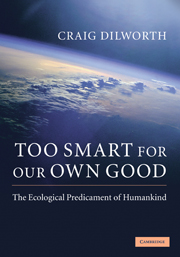Book contents
- Frontmatter
- Contents
- List of figures and tables
- Preface
- Introduction
- 1 Scientific ground rules
- 2 The new views in anthropology, archaeology and economics
- 3 Theoretical background to the vicious circle principle
- 4 The vicious circle principle of the development of humankind
- 5 The development of humankind
- 6 The vicious circle today
- 7 … and too dumb to change
- Conclusion
- Glossary
- Notes
- References
- Index
Conclusion
Published online by Cambridge University Press: 25 January 2011
- Frontmatter
- Contents
- List of figures and tables
- Preface
- Introduction
- 1 Scientific ground rules
- 2 The new views in anthropology, archaeology and economics
- 3 Theoretical background to the vicious circle principle
- 4 The vicious circle principle of the development of humankind
- 5 The development of humankind
- 6 The vicious circle today
- 7 … and too dumb to change
- Conclusion
- Glossary
- Notes
- References
- Index
Summary
Much speaks for the viability of the theory of the development of humankind based on the vicious circle principle. It is in keeping with all of the principles of modern science, including Darwin's principle of evolution, and in fact may be said to constitute a particular application of that principle, providing a coherent view of the whole of our development right up to today. More than this, it explains such important unique phenomena as how we came into existence in the first place, the prehistoric overkill phenomenon, the food crisis in prehistory, the horticultural and agrarian revolutions, and the industrial revolution. And it explains such constantly present phenomena as human population growth, war, the striving for economic growth, and accelerating energy use, as well as the phenomena of increasing resource depletion and environmental destruction. As regards the views of others, the theory also explains and vindicates the new views in anthropology, archaeology and economics, as well as the views of Malthus, Boserup and Wilkinson with regard to population growth and economic development.
Humankind's following the VCP works counter to our survival as a species, involving as it does constantly increasing consumption, population and quantities of waste, all of which tend to move us further out of equilibrium with our surroundings, thereby increasing the likelihood of our becoming extinct. Key to this whole process is our constantly meeting vital needs through technological development, combined with the fact that there have to date always existed resources amenable to that development.
- Type
- Chapter
- Information
- Too Smart for our Own GoodThe Ecological Predicament of Humankind, pp. 453 - 454Publisher: Cambridge University PressPrint publication year: 2009

